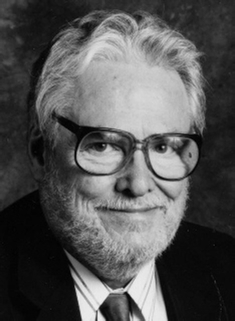

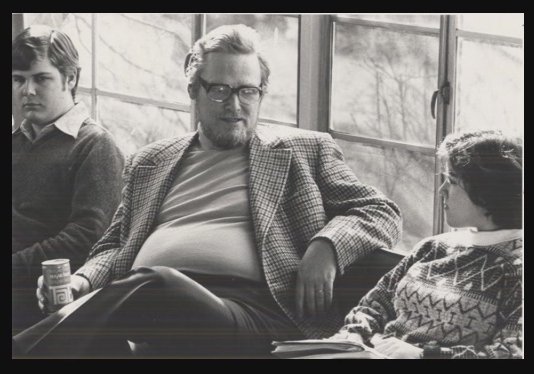 BD: You’re
helping to push them out of the nest?
BD: You’re
helping to push them out of the nest?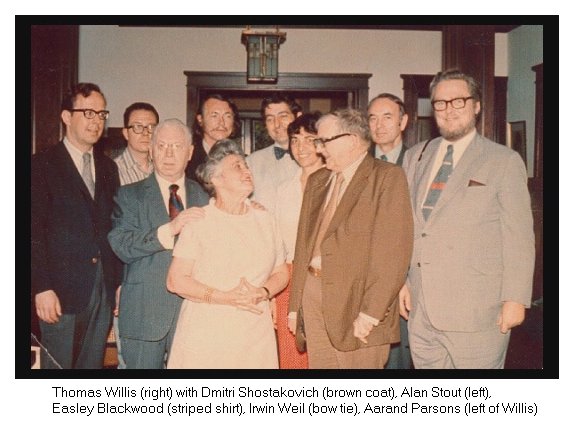 BD: Are we
potentially losing a few fine composers or
performers to money-making ventures?
BD: Are we
potentially losing a few fine composers or
performers to money-making ventures?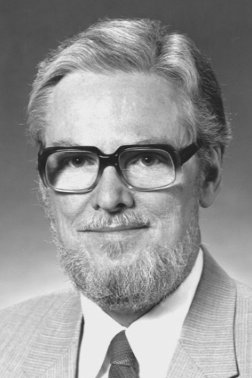 BD: How has
it evolved and changed over the
last twenty or thirty years, in terms of writing about music, either
day to day or long-range?
BD: How has
it evolved and changed over the
last twenty or thirty years, in terms of writing about music, either
day to day or long-range?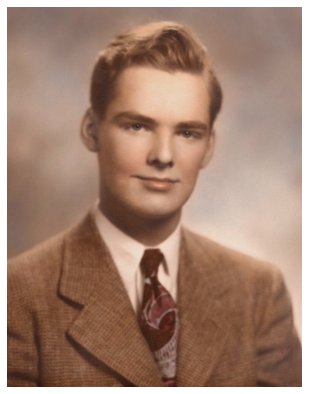 TW: Well, I
guess I’m as pragmatic an
American as anybody else in that situation. I can tell
you that when I came to the Tribune, it was as the third string
reviewer
and secretary in the office to Claudia Cassidy and Seymour Raven.
Their invitation was because Claudia went to Europe and Seymour needed
some time during the summer to spend with his family. There
was all this summer stock going on and there was all this Grant Park
going on, and later in the summer there was Ravinia. So in terms
of the coverage, the paper
had to look for its stringers in the summer time, and Seymour and
Claudia decided that there was a way that they could get
somebody on the staff, in addition to stringing everybody else who had
ever been a music critic! There were times
when we had four and five people out, but that is long gone! We
had Ed Berry and Will
Leonard and Claudia and Seymour and me. Sometimes we were out
every weekend, but that was including
theater, too, because at that point the departments were the
same. To go back to your question, six months from the time I got
there, the department decided that they didn’t need me and that
they would rather have what amounted to a full time secretary who
worked from nine to five; somebody who was a young
secretarial-type, as opposed to somebody such as myself, who was a
thirty year old learning the first of my
many mid-life career shifts. So I decided I didn’t want to go
back and pick up
on my piano teaching and the little opera company that I had
started. Having gotten into the newspaper business, I realized
that I
really liked it. There are a lot of things about the newspaper
business that fit my personality like a tee, particularly my
personality then. So I decided that I was going to make the
big pitch to stay in the newspaper business. I had been lucky
enough that I was able to eat
lunch with Lloyd Wendt, who at that time was the editor of the
Magazine, and subsequently went on up to being the editor of Chicago
Today, which was one of the Tribune’s
other papers
back in the days when we had other newspapers. So I had a long,
serious talk with Lloyd, and with
another man who was also a mentor to me in the newspaper business,
Walter Simmons, about how I could stay in the paper. He said,
“The only way I can think of that you can stay in the paper is go
over to Neighborhood News.
If you really want to learn the
newspaper business, we’ll move you around very fast, and I don’t have
any idea what will come of it but at least we’ll find out what you’re
good for. Anybody who’s got the kind of education background
that you have ought to be able to make this happen. And we won’t
pay you very much at the start.” I came to the paper in July, and
by
February I found myself working in the
Neighborhood News, covering,
as you said, anything that
could happen on the Southwest side that would go into what was then the
Metropolitan sections of the Tribune.
We had these five
zoned
Metropolitan sections that reported what amounted to
suburban news. It was fascinating in so many ways! Not only
did I
get out to learn suburbia, having been on the North Shore and
encapsulated in academe as a student, getting out to the Southwest side
of Chicago was a real learning experience in terms of the socialization
of Tom Willis. The other thing was that all of the section
editors, which I became
quite quickly, made their own picture assignments.
They choose their own photographs and had to work with the
copywriters and the make-up people who made the final
decision because they were the old pros. The Tribune placed its
young people with the old pros that were on their way out. So
that was one of the ways in which the tradition went.
TW: Well, I
guess I’m as pragmatic an
American as anybody else in that situation. I can tell
you that when I came to the Tribune, it was as the third string
reviewer
and secretary in the office to Claudia Cassidy and Seymour Raven.
Their invitation was because Claudia went to Europe and Seymour needed
some time during the summer to spend with his family. There
was all this summer stock going on and there was all this Grant Park
going on, and later in the summer there was Ravinia. So in terms
of the coverage, the paper
had to look for its stringers in the summer time, and Seymour and
Claudia decided that there was a way that they could get
somebody on the staff, in addition to stringing everybody else who had
ever been a music critic! There were times
when we had four and five people out, but that is long gone! We
had Ed Berry and Will
Leonard and Claudia and Seymour and me. Sometimes we were out
every weekend, but that was including
theater, too, because at that point the departments were the
same. To go back to your question, six months from the time I got
there, the department decided that they didn’t need me and that
they would rather have what amounted to a full time secretary who
worked from nine to five; somebody who was a young
secretarial-type, as opposed to somebody such as myself, who was a
thirty year old learning the first of my
many mid-life career shifts. So I decided I didn’t want to go
back and pick up
on my piano teaching and the little opera company that I had
started. Having gotten into the newspaper business, I realized
that I
really liked it. There are a lot of things about the newspaper
business that fit my personality like a tee, particularly my
personality then. So I decided that I was going to make the
big pitch to stay in the newspaper business. I had been lucky
enough that I was able to eat
lunch with Lloyd Wendt, who at that time was the editor of the
Magazine, and subsequently went on up to being the editor of Chicago
Today, which was one of the Tribune’s
other papers
back in the days when we had other newspapers. So I had a long,
serious talk with Lloyd, and with
another man who was also a mentor to me in the newspaper business,
Walter Simmons, about how I could stay in the paper. He said,
“The only way I can think of that you can stay in the paper is go
over to Neighborhood News.
If you really want to learn the
newspaper business, we’ll move you around very fast, and I don’t have
any idea what will come of it but at least we’ll find out what you’re
good for. Anybody who’s got the kind of education background
that you have ought to be able to make this happen. And we won’t
pay you very much at the start.” I came to the paper in July, and
by
February I found myself working in the
Neighborhood News, covering,
as you said, anything that
could happen on the Southwest side that would go into what was then the
Metropolitan sections of the Tribune.
We had these five
zoned
Metropolitan sections that reported what amounted to
suburban news. It was fascinating in so many ways! Not only
did I
get out to learn suburbia, having been on the North Shore and
encapsulated in academe as a student, getting out to the Southwest side
of Chicago was a real learning experience in terms of the socialization
of Tom Willis. The other thing was that all of the section
editors, which I became
quite quickly, made their own picture assignments.
They choose their own photographs and had to work with the
copywriters and the make-up people who made the final
decision because they were the old pros. The Tribune placed its
young people with the old pros that were on their way out. So
that was one of the ways in which the tradition went.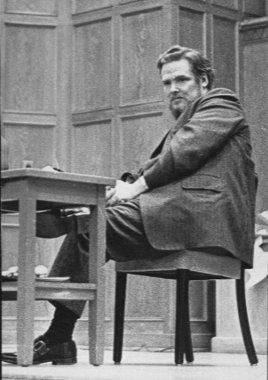 TW: [Pauses
for a moment] I’ve been thinking about that question a
great deal and, almost oddly enough, in the same way you phrased
it. Your mind and mine tend to move in some of the same
directions, Bruce. I think that the strategic plan that I helped
Dean Dobroski write for the School of Music for the next five years and
the way in which we are
trying to take the music school, indicates what I see as the best
answer to the implications of the question. This all
concerns me very deeply, and I’m here at Northwestern, turning
sixty-five in April, because I believe in this mission. I could
have not only retired — and I’m not going to retire — but I could
also have gone back to being an academic instead of an
administrator. Now I
only teach one or two courses a year, three at the most, and spend most
of my time in administration. A lot of it is assisting the
Dean in the activities that focus around exactly what
you’re suggesting. We do not want to train alto flutists who
will join the hundred and fifty alto flutes who would
audition for the Chicago Symphony Orchestra exclusively. On the
other hand, it makes absolutely no sense to train performers at
all if you don’t train them to the high standard that will at least
make them a force in the marketplace. They have to have their
chance. The question is, what do you do with a population that is
increasingly diverse, that do have a lot of this ability, but
who are going to have to have quite a lot more than that if they’re
going to take their place in what’s going on right now? Almost
every boundary
has to be tested, and almost everything has to be put together
differently. The School of Music is trying to keep from training a
glitzy bunch of professional performers. That
is happening in the major music schools, one way or another, across the
country. Even at Julliard. Dean Polisi has
done a great deal of very interesting things there, trying to
figure out how to deal with the fact that Julliard must be modified so
that the students that are there do avoid being encapsulated to the
degree that some of us were who were in
very specialized performance practice, and which many of the
teachers feel is the only way to success. So the administrators
always have their battles with certain members of their faculties;
that’s always been the case, you know.
TW: [Pauses
for a moment] I’ve been thinking about that question a
great deal and, almost oddly enough, in the same way you phrased
it. Your mind and mine tend to move in some of the same
directions, Bruce. I think that the strategic plan that I helped
Dean Dobroski write for the School of Music for the next five years and
the way in which we are
trying to take the music school, indicates what I see as the best
answer to the implications of the question. This all
concerns me very deeply, and I’m here at Northwestern, turning
sixty-five in April, because I believe in this mission. I could
have not only retired — and I’m not going to retire — but I could
also have gone back to being an academic instead of an
administrator. Now I
only teach one or two courses a year, three at the most, and spend most
of my time in administration. A lot of it is assisting the
Dean in the activities that focus around exactly what
you’re suggesting. We do not want to train alto flutists who
will join the hundred and fifty alto flutes who would
audition for the Chicago Symphony Orchestra exclusively. On the
other hand, it makes absolutely no sense to train performers at
all if you don’t train them to the high standard that will at least
make them a force in the marketplace. They have to have their
chance. The question is, what do you do with a population that is
increasingly diverse, that do have a lot of this ability, but
who are going to have to have quite a lot more than that if they’re
going to take their place in what’s going on right now? Almost
every boundary
has to be tested, and almost everything has to be put together
differently. The School of Music is trying to keep from training a
glitzy bunch of professional performers. That
is happening in the major music schools, one way or another, across the
country. Even at Julliard. Dean Polisi has
done a great deal of very interesting things there, trying to
figure out how to deal with the fact that Julliard must be modified so
that the students that are there do avoid being encapsulated to the
degree that some of us were who were in
very specialized performance practice, and which many of the
teachers feel is the only way to success. So the administrators
always have their battles with certain members of their faculties;
that’s always been the case, you know.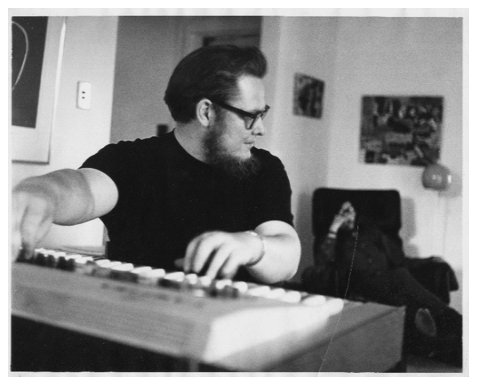 TW: There are
a lot of cognitive and perceptive people who are answering that
question in some very interesting ways in hard data
research.
There’s no question about the fact that the person who plays, the
person who actually does it — I don’t care whether you’re talking about
football or music or anything else — however much or little he has
done, if he’s done it enough to learn the rules of the game and the
physiology of it so that the physiology can then be stimulated by the
senses, he’s going to have a different level of understanding and a
different level of activity in his head than if he’s pulled it off the
shelf. That’s the reason why I feel so strongly that we
need to
have performance-based instruction. I’m now looking into higher
education, but several of my friends are looking at it in
terms of kindergarten and pre-kindergarten things. We must keep
that performance capability, regardless of how simple it may seem to
those of us who are accustomed to working on a
very high intellectual level.
TW: There are
a lot of cognitive and perceptive people who are answering that
question in some very interesting ways in hard data
research.
There’s no question about the fact that the person who plays, the
person who actually does it — I don’t care whether you’re talking about
football or music or anything else — however much or little he has
done, if he’s done it enough to learn the rules of the game and the
physiology of it so that the physiology can then be stimulated by the
senses, he’s going to have a different level of understanding and a
different level of activity in his head than if he’s pulled it off the
shelf. That’s the reason why I feel so strongly that we
need to
have performance-based instruction. I’m now looking into higher
education, but several of my friends are looking at it in
terms of kindergarten and pre-kindergarten things. We must keep
that performance capability, regardless of how simple it may seem to
those of us who are accustomed to working on a
very high intellectual level.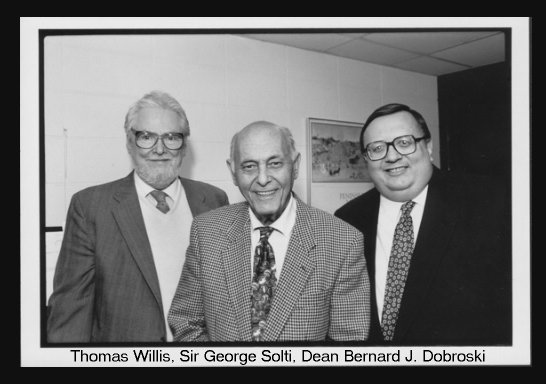 BD: I hope
there will always be some who will at least try. Is it helping or
hindering that now some of these
purely musical scores are being put on the television with light shows
and all kinds of things coming at you besides just the sound?
BD: I hope
there will always be some who will at least try. Is it helping or
hindering that now some of these
purely musical scores are being put on the television with light shows
and all kinds of things coming at you besides just the sound?|
Thomas Willis, 76, former School of Music faculty member, died Sept. 23, 2004, at Manorcare nursing home in Wilmette. Mr. Willis, who had a long career as music and arts critic and editor at the Chicago Tribune, taught music history, managed Pick-Staiger Concert Hall and served as executive assistant to the dean at the School of Music. He began at Northwestern as a part-time visiting lecturer in 1967. He became a full-time faculty member in 1977 when he resigned from the Tribune after a 20-year career there. He later became an associate professor before retiring in 1999. Mr. Willis wrote the essay for a photo book on the Chicago Symphony, hosted a classical radio program for former Chicago station WEFM-FM and was on the music panel of the National Endowment for the Arts. A native of Flat Rock, Ill., he graduated from
Northwestern with a bachelor of
music degree in 1949 and later pursued graduate studies at Yale
University. He
received a Ph.D. in music history from Northwestern in 1966. From the
Northwestern University Observer |
This interview was recorded in Chicago on February 15,
1993. Portions (along with recordings) were
broadcast on WNIB later that year and again in 1998; a portion was also
included in the Memorial Service for him at Northwestern University in
November of 2004. The
transcription was made in 2008 and posted on this
website in 2009.
Award-winning broadcaster Bruce Duffie was with WNIB, Classical 97 in Chicago from 1975 until its final moment as a classical station in February of 2001. His interviews have also appeared in various magazines and journals since 1980, and he now continues his broadcast series on WNUR-FM, as well as on Contemporary Classical Internet Radio.
You are invited to visit his website for more information about his work, including selected transcripts of other interviews, plus a full list of his guests. He would also like to call your attention to the photos and information about his grandfather, who was a pioneer in the automotive field more than a century ago. You may also send him E-Mail with comments, questions and suggestions.